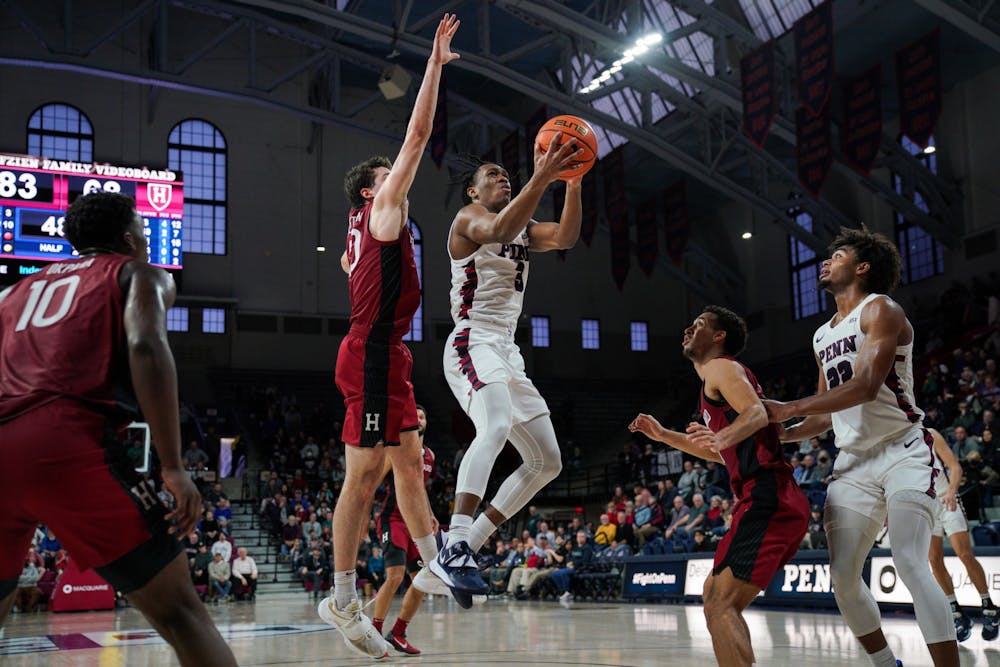
For the 138th time in Ivy League basketball history, Penn has proven that its Red reigns superior to Harvard's Crimson.
On Saturday, Penn (14-11, 6-4 Ivy) traveled to Cambridge, Mass. for a decisive matchup against Harvard (12-12, 3-7). Following an 80-72 win, the Quakers are tied for third with Brown in Ivy standings.
Saturday was also a premier matchup between the Ancient Eight’s top two leading scorers: Penn junior guard Jordan Dingle and Harvard senior forward/guard Chris Ledlum. Before today’s matchup, Dingle was averaging 24.5 points per game and Ledlum was contributing 18.5. They stayed true to their scoring splits, with Dingle finishing with 25 and Ledlum finishing with 19.
Dingle proved his scoring capabilities early, going 3-for-3 from beyond the arc in the first half despite contention and scoring against Ledlum on a breakaway after a Harvard turnover. Dingle already had 10 points at the five-minute mark to give the Quakers an early 10-point lead.
Another key aspect of Penn’s play that kept them in control throughout the first half was the team's defense. Penn had several steals against Harvard that led to fast breaks to the other end early in the game. A standout defensive play came from senior guard Lucas Monroe, who got a huge steal that led to a posterized dunk over Ledlum to bring Penn to a 13-point lead.
Excellent ball movement also helped build Penn's lead. There were multiple instances throughout the half that led to open shots, including sophomore guard George Smith foregoing a reverse layup to give junior guard Andrew Laczkowski a free layup.
But coming into the second half, Ledlum decided to change gears. He led the charge for Harvard, and the Crimson momentum picked up, partially thanks to foul trouble. Penn had seven fouls in the first 13 minutes of the second half, compared to Harvard’s three. Sophomore forward/center Nick Spinoso and junior guard Clark Slajchert had three and four fouls respectively — not the best look considering how much of the offense runs through the two, especially the former.
Another huge contributor to keeping the game so close down the stretch was turnovers by the Quakers. They had over 15 turnovers, including shot clock violations and ill-advised cross-court passes, that slowed down their offense and fed into Harvard’s.
Despite Penn controlling almost the entire game until then, Harvard came back to bring the score to 64-59 with three minutes left, capitalizing on a huge 14-3 run.
To end the game, Penn decided to return to basics. They sent in a strong defensive unit and took back offensive control.
“There were certainly times when it seemed like the play was gonna be broken and then a second effort, getting to the offensive glass, really helped us out," Dingle said. "That offensive rebounding is something we need to keep doing to be successful."
The Quakers just knew how to respond — something that is different compared to how they started their conference schedule.
“I think that we’re just responding better to adversity as a team,” Dingle said. “Typically once things went bad late in the game, there’d be a snowball effect and it would carry over and we would take ourselves out of the game. Now, we don’t do that as much. I think that we respond much better as a team and we’ve shown a lot of growth and maturity.”
It was almost like Harvard’s run never happened, with Penn still winning by eight and extending their win streak to five. But with the battle for the coveted four spots in the Ivy League Tournament still ongoing, they’ll need to maintain that win streak to remain in contention.
The Daily Pennsylvanian is an independent, student-run newspaper. Please consider making a donation to support the coverage that shapes the University. Your generosity ensures a future of strong journalism at Penn.
Donate







